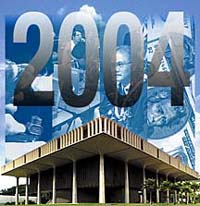
Schools bill aims
to shrink classesOpponents of the bill, which
goes to the full House and Senate,
say it lacks real reform
Class sizes would be lowered in early grades, and principals would control at least 70 percent of public school spending, under a bill approved yesterday by state House and Senate conferees.
The Democratic-sponsored bill, which goes to the full House and Senate, also mandates school community councils at all campuses to give parents and staff a say in the academic and budget plans for their schools.
Star-Bulletin Legislature Database
Star-Bulletin Legislature Guide
(PDF, 2.4 MB)
State Legislature: Bills
& Hawaii Revised Statutes
"This is real change, when 70 percent of the operating money goes directly to the school," said House Education Chairman Roy Takumi (D, Pearl City-Pacific Palisades). "Only one school district in the country does that."
"The school councils will result in shared decision-making by the community," he added. "And we are giving people what they have asked for: more textbooks and smaller class sizes."
The bill includes $2.1 million to hire 75 elementary teachers to lower class sizes in kindergarten through second grade, so that classes with more than 25 students would be allocated a second teacher. Another $2.5 million is earmarked for textbooks and other learning materials not included in the regular budget.
Gov. Linda Lingle had pushed to break up the Department of Education into local school boards and give schools control of 90 percent of the Department of Education's operating budget. Her senior policy advisor for education, Randy Roth, called the Democrats' bill "a big disappointment."
"I think it's a real missed opportunity," Roth said. "There's a lot of interest in finally decentralizing the system, a lot of interest in creating real accountability for student achievement, a lot of interest in changing the culture of the DOE. ... This bill falls short in all of those categories."
But schools Superintendent Pat Hamamoto said it means "deep structural changes" for her department by altering the flow of funds and requiring schools to collaborate with their community.
"The more money and resources we can get to the individual schools, the better we feel student achievement will be," she said.
The "weighted student formula" gives principals more flexibility in their budgets by allocating funds to each school based on the individual needs of their students. Students who cost more to educate, such as those who speak limited English, would get a higher "weight" or "price tag," and that money that would follow them to whatever school they attend.
Under Senate Bill 3238 CD1, the formula would take effect in the 2006-2007 school year here, after individual weights are determined by a committee. The school community councils would begin operation in the 2005-2006 school year, following a pilot program in several schools next year.
The House and Senate conference committee voted 12-1 in favor of the bill, with Sen. Bob Hogue (R, Kaneohe-Kailua) voting against it. He said he supported some elements of the bill but felt it "left out one big voice, and that's the voice of the people" because it did not provide for a vote on local school boards.
Lingle's major education plank -- a constitutional amendment to break up the Department of Education into local school districts -- is dead this session, along with the Democrats' alternative, which would have expanded the school board and made each member responsible to a specific geographic district.
Instead, the omnibus bill requires Board of Education members to hold community meetings in their districts in addition to the formal meetings. It also appropriates $1.7 million for parent-community networking centers to encourage parental involvement. A recent audit found parental support to be missing in Hawaii's most troubled schools.
The bill defers another element of Lingle's reform plan: putting principals on performance contracts. Instead, a working group will be convened to plan for the implementation of performance contracts for principals in the 2006-2007 school year, when the new budget formula takes effect.
To address the shortage of principals and teachers, the bill sets aside $500,000 to fund seven teacher education positions and one faculty position in educational administration at the University of Hawaii College of Education. It appropriates $500,000 for a principals' academy to train educational leaders. It also gives teachers who earn National Board Certification a $5,000 annual bonus for 10 years. To date, about 60 teachers have earned such certification.
BACK TO TOP |
School community councils get a say
Some highlights of the omnibus education bill approved yesterday:>> Giving principals control of 70 percent of the Department of Education's budget, excluding debt service and capital improvements.
>> School community councils to share decision-making at each campus.
>> $2.1 million to lower class sizes in kindergarten through second grade.
>> $2.5 million for math textbooks, to help combat low test scores in that subject.
>> Requiring a single school calendar for all public schools starting in 2006-07 school year.
>> Funding for eight new positions at the College of Education to train teachers and principals to address the shortage of both positions.
>> $2 million for information technology to implement the No Child Left Behind Act and the weighted student formula.
>> $460,000 to fund full-time student activity coordinators in the high schools, as requested by the Hawaii State Student Council.
